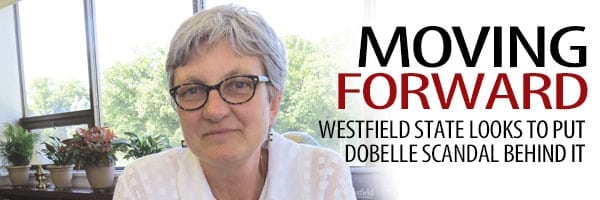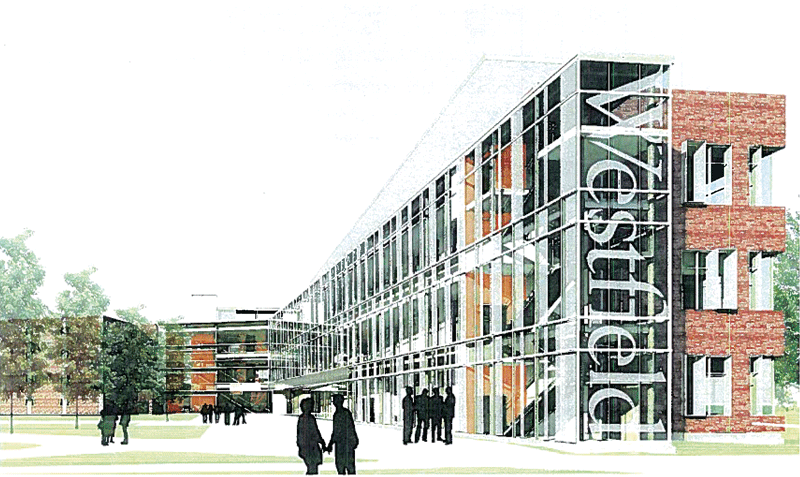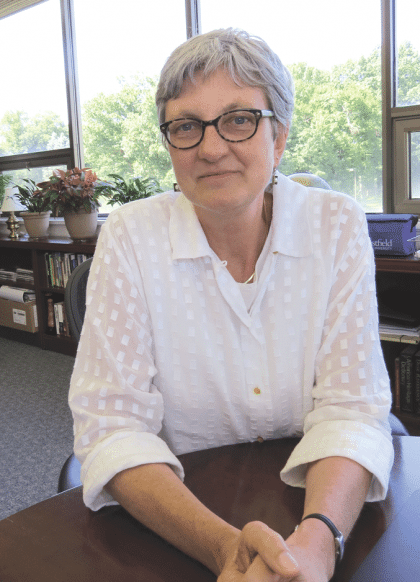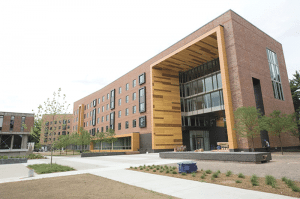
Moving Forward
Westfield State Works to Put the Dobelle Controversy Behind It
Elizabeth Preston acknowledged that, in the vast majority of cases, when someone in academia has the title ‘interim president’ in front of their name, they are usually in a caretaking role, holding down the fort until the institution chooses its next leader.But at Westfield State University, that hasn’t always been the case. In fact, it’s been more of the exception than the rule, she said, noting that individuals have been called upon to restore order and change the tenor of front-page headlines in the wakes of scandals in the ’80s that led to the resignations of Frank Pilecki and Irving Buchen.
And that is the situation that Preston, formerly the school’s vice president of Academic Affairs, finds herself in as she serves as interim leader following the tumultuous end to what could only be called the Evan Dobelle era at WSU.
It’s been roughly eight months since Dobelle, who by then had the adjective ‘embattled’ seemingly attached to his name and title, abruptly retired amid a searing controversy over his lavish spending of university resources. Dobelle, who had been suspended from his $240,000-a-year job with pay while a law firm hired by the university’s board of trustees investigated his spending habits, had vowed to fight for that job, filing a federal lawsuit against the trustees and accusing the chairman of conspiring to destroy his reputation.
But he eventually stepped down for what he said was the good of the university — although state and federal lawsuits he’s filed against various parties are still pending — and Preston, who has also served as dean of faculty and chair of the school’s Communications Department, stepped into the breach, first as acting president, then as interim, which means she’ll serve until a new president is selected — a year from now, by most estimates. She will not be a candidate for the permanent position.
Today, most of the headlines concerning the university — and the Dobelle controversy — concern the size of the legal bills the school has amassed in this mess (roughly $1.3 million to date), and there is still the rather large matter of a state inspector general’s report on the school’s noncompliance with the state’s Public Records Law, which was due to arrive several weeks ago, but is still being awaited.
But Preston believes that, to a large degree, the university is succeeding with the ongoing work of putting the Dobelle scandal behind it and moving on with the present, and especially the future.
It is being helped in this regard by the school’s 175th-anniversary celebration — which has come in parts and is still in progress (more on that later) — because there have been a number of events that have helped the campus community focus on the positive, said Preston, and also change the tone of news coverage and begin the discussion about what the school could, and should, look like when it turns 200.The sentiment can be summed up with the phrase ‘moving forward,’ which is more than the name given to a website (www.westfield.ma.edu/movingforward) created to serve as the university’s official resource for information on the inspector general’s investigation and related legal action.
Indeed, it is also a mindset.
Looking back on the academic year that began last September and ended in May, Preston said that, while there were some bright spots, this was what amounted to a timeout for the college, as the Dobelle controversy played itself out in the media, he eventually retired, and the school dealt with the aftereffects.
“And you can’t have a two-year timeout. You can’t sit in the break-down lane for two years. That’s simply not an option in higher education today,” she went on, adding that evidence that this won’t happen comes in a number of forms. They range from enrollment numbers for this fall, which are slightly higher than last year, and on target with the administration’s goals, to fund-raising efforts, including a successful initiative that was part of the recent 175th Anniversary Gala, to comments she’s received from faculty, students, and parents.
Meanwhile, there are other positive developments, such as the planned construction of a new science center, the matriculation of the school’s first class of nursing students last spring, and a collaborative initiative with Holyoke Community College to improve access to, and the affordability of, a bachelor’s degree.
For this issue and its focus on education, BusinessWest talked at length with Preston about what being interim president means in this situation, and about what’s next for this school as it marks a milestone.
Altered State
Preston was vacationing in Yosemite National Park last July when the controversy surrounding Dobelle and his spending habits started to reach a boiling point.
She had only limited Internet access where she was staying, but enough to learn that a special meeting of the board of trustees had been called. “That’s when it first occurred to me that this was serious.”
That wasn’t the first time she allowed herself to think about having to assume the role of acting president — the vice president of Academic Affairs is next in line in such situations, according to the school’s well-entrenched succession plan — but it was the first time she thought it was a real possibility.
And four controversy-filled months later, it was reality.
A few weeks after that, her title changed to interim president, which is not an automatic progression, but a role she wanted and one the board of trustees asked her to accept.
It’s been a learning experience on many levels, one that has taken her out of what she called her “comfort zone” within academic affairs, but she’s found it rewarding in a number of ways.
“I was a little bit unprepared for the feeling of responsibility that I have — I’ve always been in a position where there was someone else who was ultimately responsible for things,” she explained. “There’s something very challenging about knowing that you’re responsible for the institution. That would be challenging under any circumstances, but under these circumstances, it’s been more difficult.”
Preston told BusinessWest that, from the beginning, she’s considered her job description as interim president to be fairly simple, even if carrying out that assignment isn’t.
“I thought I clearly had the responsibility for boosting morale and restoring confidence,” she explained, adding that she has gone about this in a number of ways, from effectively communicating not only with the campus but the outside community as well, especially with the ‘moving forward’ website, to putting in place spending safeguards to prevent another controversy like the one authored by Dobelle, to revamping the school’s financial-management team by creating two new positions that focus on internal auditing and risk management.
The website is a key part of the process of putting information in the hands of those who want and need it, and being completely transparent, she said, stressing the importance of communication — at all times, but especially in situations like these. The site answers often-asked questions about the inspector general’s investigation, which began last August, other investigations, ongoing litigation and the accompanying costs to the school, the impact of the scandal on enrollment and fund-raising, and even the search for a new president.
As she talked about the past academic year, using that term ‘timeout’ on more than one occasion, Preston said it’s obviously been a challenging time for the school — and for her.
But in some ways, she said she’s been pleasantly surprised by how quickly the school has seemingly recovered, while also acknowledging that maybe she shouldn’t be surprised.
Indeed, Preston told BusinessWest that, in many ways, the Dobelle scandal, while it received national and international coverage, did not leave what she would consider a deep mark on the school. Few on the campus were really affected by the spending controversies, she noted, and many at the school have been able to focus on the many positive developments from Dobelle’s tenure, and not on how or why it ended so badly.
“The controversy really hasn’t affected much of the work of the university,” she explained. “In terms of morale, Evan Dobelle did a lot of good things for this university, and he greatly elevated its profile.”
School of Thought
Backing up a bit, she noted that, prior to Dobelle’s arrival, WSU endured two caretaker interim presidencies following the departure of Vickie Carwein and then a failed presidential search. This led to what she called “pent-up energy” when Dobelle arrived that translated into a number of initiatives.
She used one — a greater focus on international programs — to show how this pent-up energy manifested itself.
“There was a lot of interest in international study-abroad programs and travel-abroad trips; the faculty had been proposing those kinds of programs for years on campus and hadn’t been able to get any traction,” she explained. “He [Dobelle] opened the doors to all kinds of international programs, and that was typical of a number of things.
“There was a lot of interest in movement on campus in a number of directions,” she went on, “and he elevated the profile of the institution and also empowered faculty and staff to do a number of things they wanted to do; there were a lot of people on campus who were very partial to his presidency.”
So when the controversy broke and Dobelle was eventually compelled to resign, some felt a sense of loss, while others experienced a sense of betrayal, she went on, adding that the extensive, global media coverage and commentary that slammed not only Dobelle, but the trustees — first for hiring him and then for an apparent lack of oversight — made matters much worse.
It all added up to a challenging period, but one that she doesn’t believe has lingered.

A new science building, seen here in an architect’s rendering, is one of many positive developments taking place on the Westfield State campus.
She can’t pinpoint exactly when that happened, but a social event late last fall may have been a factor in accelerating the healing process.
“There were no speeches, and there was no program,” she said of the gathering. “There was just a chance for everyone to reconnect. I think that was the beginning of the process of rebuilding morale on campus.”
Meanwhile, the 175th anniversary and various celebrations to mark that occasion provided not necessarily a distraction, she went on, but a chance to focus on the institution’s history, future, and core values.
“When you celebrate something like a 175th anniversary, what gives that occasion such power is what it allows you to recognize and talk about where the institution has been, and also about the timeless values that have been the foundation of everything you’ve been doing, and how much they’re still present.
“It gave us a chance to celebrate being a public institution, our history of inclusion, and the centrality of service to our academic programs and the campus culture,” she went on, “because those have been part of the institution for 175 years, and it gave people a chance to be proud of who we are and where we’ve come from; it was very helpful in moving the institution forward.”
The festivities culminated with a gala on campus on March 29. The event raised more than $125,000 for scholarships, the highest total for a single event in the school’s history.
And the 175th celebration will continue, she said, adding that there is some “fuzziness” about the dates surrounding the school; the Legislature approved the charter for Framingham State and what became Westfield State in 1838, but the schools didn’t open until the fall of 1839.
Moving forward (there’s that phrase again), the school is looking at new enrollment of more than 1,500 students this fall, which will exceed the target set by administrators. Meanwhile, work is expected to commence this fall on the new, $48 million science building, the first new academic building on campus in nearly 40 years.
There are other initiatives, such as an RN-to-BSN initiative that will be part of a growing Allied Health program, as well as the articulation agreement with Holyoke Community College, which will enable students at HCC to transfer from that school’s online associate’s degree program to WSU’s complete online bachelor’s degree program.
“We have a lot going on here,” said Preston, adding quickly that such initiatives may not be generating big headlines, at least when compared to those stories about the school’s legal bills, but they do provide evidence that the timeout is clearly over.
Steady Course
Preston wanted to make it clear — and did — that the Dobelle controversy and its aftereffects are not entirely in the rear-view mirror.
The inspector general’s report still hangs over the campus, as do the lawsuits filed by Dobelle and the resulting legal fees. Meanwhile, there are several vacancies on the board of trustees resulting from resignations and expiring terms.
“We’re not on the other side of this completely,” she told BusinessWest, adding quickly that, with the issues that matter most — those of morale, momentum, and positive energy with regard to what comes next — the school has in almost every sense turned the corner.
Which means that Westfield State University is moving forward — in a great many ways.
George O’Brien can be reached at [email protected]






